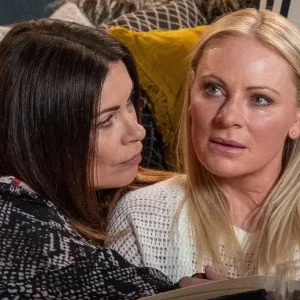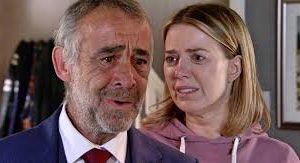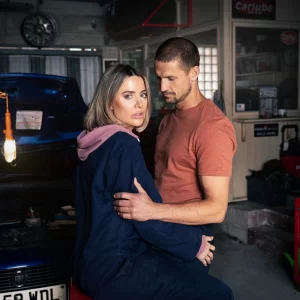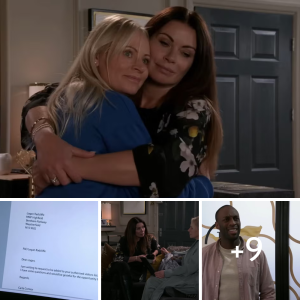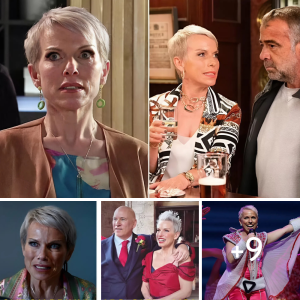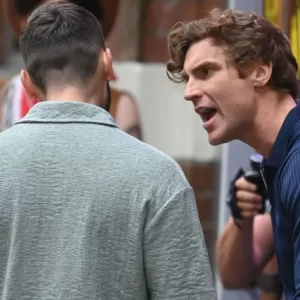In a poignant tale of farewell, love, and resilience, The Final Curtain tells the heartfelt story of a woman whose legacy on screen is rivaled only by her strength off it. Set against the backdrop of the English countryside, this emotional drama follows a beloved actress, Julie, as she parts with the home that once symbolized glamour, eccentricity, and comfort — a place affectionately known as Leopard Lodge.
Julie Goodyear, a name etched into the memory of generations of TV fans, made her mark as the iconic Bet Lynch on the long-running soap Coronation Street. With her beehive hair, bold makeup, and even bolder attitude, Bet became a British TV legend, and Julie herself became a cultural icon. But in her later years, away from the cameras, Julie’s life took a quieter, more intimate turn — until it was shaken by a diagnosis that changed everything.
The film opens with serene shots of a quirky mansion nestled in the green landscapes of Heywood, Greater Manchester. The property, bathed in golden afternoon light, looks like something from a dream — or perhaps a dream remembered. The interiors are a perfect reflection of Julie’s personality: leopard print from floor to ceiling, from armchairs to oversized rugs, even a plush leopard toy watching from the corner sofa. It’s not just a house. It’s a statement. A memory. A legacy.
But as Julie, now 82, stands by the window beside her husband Scott, their hands quietly intertwined, the mood is tinged with melancholy. The couple has decided to sell the mansion. Not for profit. Not for prestige. But for peace. Julie is now facing her most personal battle — dementia. And with courage and grace, she’s choosing to downsize, simplify, and make space for the moments that truly matter.
The film delicately reveals Julie’s journey, beginning with her decision in October to list the four-bedroom farmhouse for £1.5 million. It’s a symbolic moment — letting go of a part of herself, yet doing so on her terms. As months go by, the price lowers — first to £1.4 million, then again in December to £1.3 million. It’s not just about numbers, but about finding someone who sees the soul in the place, who will love it like she did. The price drops echo a deeper emotional release — the slow, gentle surrender of an era.
Throughout the movie, flashbacks highlight Julie’s glamorous past: her laughter on set, her infamous leopard-print outfits, the dazzling public appearances, and the thunderous applause of fans who adored her. These moments are juxtaposed with quieter scenes from her present — sipping tea with Scott, flipping through photo albums, or walking slowly through the garden, her pace unsure but her spirit unbroken.
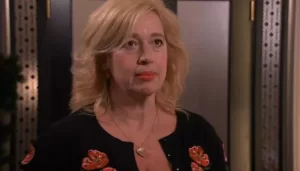
In one emotional scene, Julie sits in the very leopard-print armchair she once posed for countless magazine covers in. She smiles at the soft toy leopard on the couch — a symbol of her old self, fierce and unapologetic. She leans over and whispers to it, “Time to let go, old friend.”
As word spreads that the iconic property is on the market, nostalgia takes hold. Media outlets pick up the story, fans reminisce online, and neighbors recall the days when the house would light up with parties and laughter. But for Julie and Scott, the house is no longer a center stage. It’s become a beautiful echo. And it’s time to move on.
The final act is quiet but powerful. After months of negotiations, a buyer is found — someone who appreciates the uniqueness of the property and promises to keep its spirit alive. The papers are signed. Julie and Scott stand at the gate for one last look. The leopard prints still adorn the furniture, but soon they will belong to someone else.
As they drive away, Julie looks back. Her voice, in narration, breaks the silence: “It’s not the house that made me strong. It was the life we lived in it. And life… life still goes on.”
In a postscript scene, we see the couple in their new, simpler home. There’s a small vase of fresh flowers on the table. A framed photo of Julie in her Bet Lynch days sits proudly on a shelf. And beside her, Scott holds her hand as they look out into a new garden. The fight with dementia continues, but Julie faces it with the same spirit that once made her a household name — bold, vibrant, and unafraid.
The Final Curtain is more than a story about selling a house. It’s a moving portrait of love in later life, of identity beyond fame, and of finding peace amid life’s greatest challenges. It reminds us all that sometimes, the bravest thing you can do… is say goodbye.
